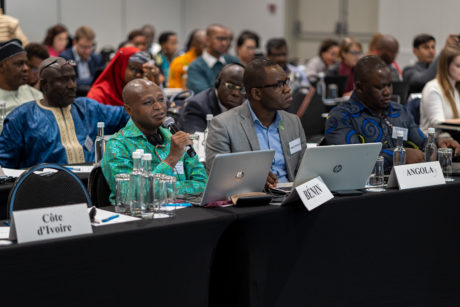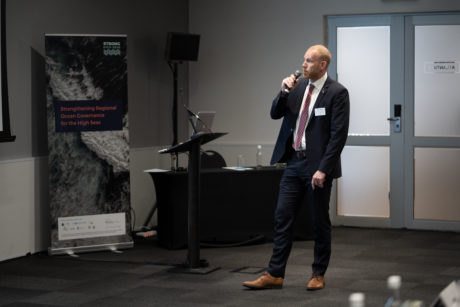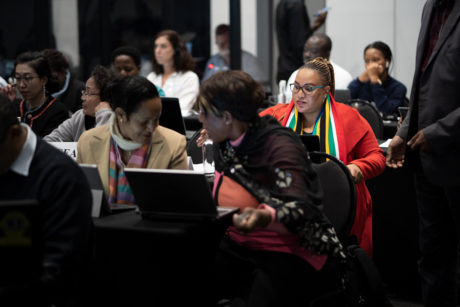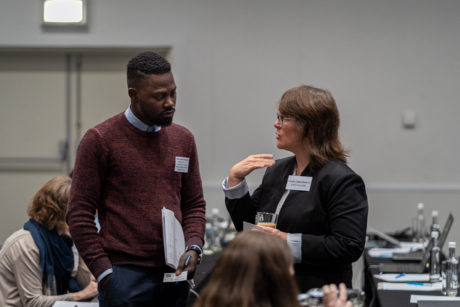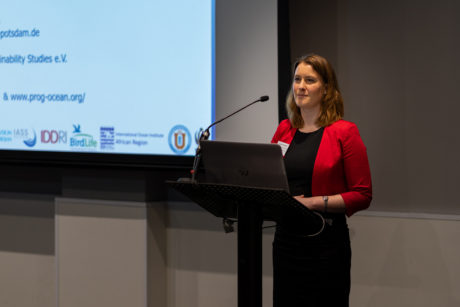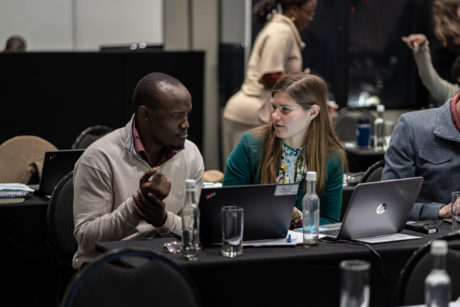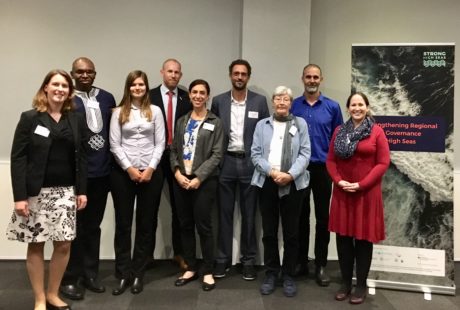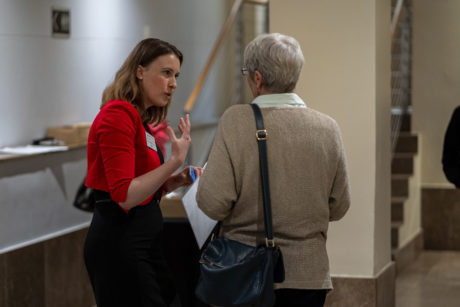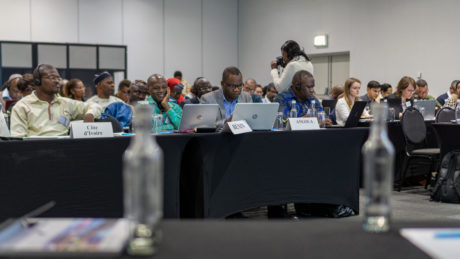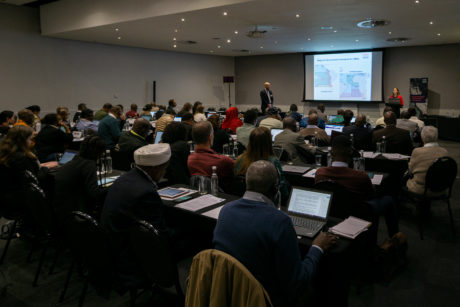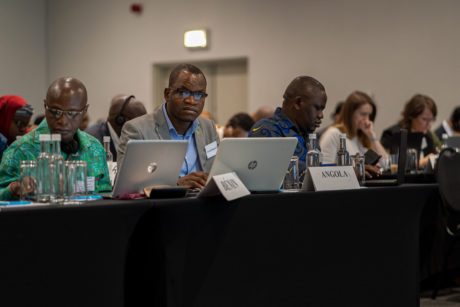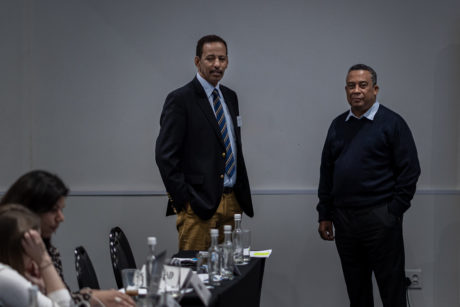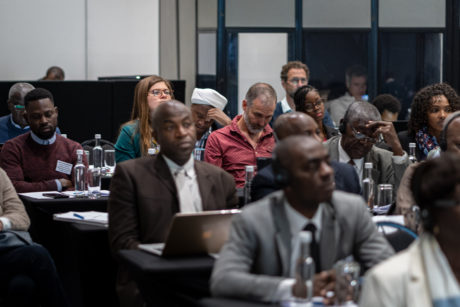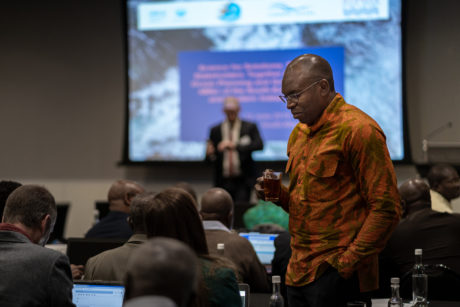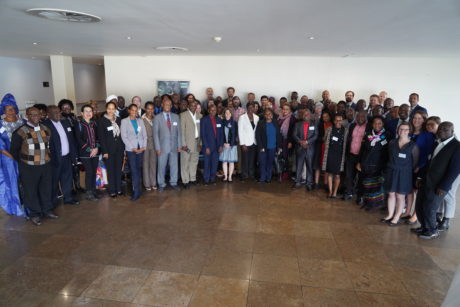Member States representatives of the Abidjan Convention and Nairobi Convention from Angola, Benin, Cabo Verde, Cameroon, Comoros, Congo, Côte d’Ivoire, DR Congo, Gabon, Guinea, Guinea Equatorial, Kenya, Liberia, Madagascar, Mauritius, Nigeria, Sao Tomé e Príncipe, Seychelles, Somalia, South Africa, Tanzania, The Gambia, Togo, global and regional organisations, regional scientific institutions, academia and NGOs took part in a three-day workshop from 10 – 12 June 2019 in Cape Town, South Africa.
Organised by the STRONG High Seas Project, the ABNJ Deep Seas Project, Abidjan Convention Secretariat and Nairobi Convention Secretariat, the workshop was titled Science for solutions: bringing stakeholders together to improve ocean planning and governance of ABNJ in the Southeast Atlantic and Western Indian Ocean. A varied programme including presentations, group and plenary discussions as well as interactive exercises, provided the 80 participants with an opportunity to discuss the current status, interests and challenges for global and regional ocean governance and to foster exchange and build new networks.
This workshop is part of a series of workshops organised under the ABNJ Deep Seas and STRONG High Seas projects in the Western Indian Ocean and Southeast Atlantic regions, respectively. This workshop is the closing workshop of the ABNJ Deep Seas project, which will end in August 2019, and the second dialogue workshop of the STRONG High Seas project. The first dialogue workshop under the STRONG project took place in Abidjan, Côte d’Ivoire in June 2018, and three more are planned until 2022.
Following the workshop, a collective meeting between the Abidjan Convention member States and the Nairobi Convention member States took place on 12 June 2019 to discuss and agree upon a collective understanding from the two regions regarding marine areas beyond national jurisdiction (ABNJ) and related marine and coastal issues.
On 13 June 2019, the Abidjan Convention Secretariat also organised a meeting of its ABNJ Working Group. During this meeting, the terms of reference, programme of the Working Group and elements to be considered were discussed and recommendations on the working group’s next steps were made.
Key messages from the workshop
- The ‘Science for Solutions’ workshop brought together State representatives from the Abidjan Convention, the Nairobi Convention, as well as a range of stakeholders from global and regional organizations, science, academia and NGOs. It was followed by the first joint meeting between the two Conventions.
- This workshop offered a space for convention member States, the Secretariats, sectoral organisations and academia to present their work and discuss critical aspects relevant to areas beyond national jurisdiction (ABNJ) and marine biodiversity beyond national jurisdiction (BBNJ) issues. Workshop participants highlighted the importance of organising these dialogue workshops in the region to discuss issues related to ABNJ, and particularly in relation to the BBNJ process.
- The workshop highlighted the progress of the ABNJ Deep Seas and STRONG High Seas (Strengthening Regional Ocean Governance for the High Seas) projects in the Southeast Atlantic and Western Indian Ocean. The ABNJ Deep Seas project is ending in August 2019 and the STRONG High Seas project is in its second year of implementation (continuing until May 2022).
- Participants recognized of the importance of conservation and sustainable use of marine biodiversity in ABNJ.
- It is important to engage in further debates and negotiations related to ABNJ at the national, regional and global level. Opportunities to support ongoing national and regional policy processes should be identified to support greater involvement of African states in the BBNJ negotiations.
- Cross-sectoral collaboration and communication is needed at both the national, regional and global level to advance the governance of ABNJ. The importance of sharing knowledge and experience between regions, such as on marine spatial tools and the identification of existing legal frameworks for their use in ABNJ, was underscored.
- A multi-level stakeholder engagement platform for the region will require clear objectives, a common vision on the needs and interests of the different stakeholders of the region, sufficient financial resources to guarantee its long-term use, and be cost-effectively managed. In this regard, workshop participants also emphasised that cooperation amongst academics in the region is required, as well as more science to underpin the development of policies.
- Many African states lack national ocean governance structures. These could be more easily developed once strong regional and global structures are in place.
- Research is ongoing in both regions, but knowledge and data gaps remain. Research collaboration and information sharing between states and organizations can avoid dulcification of efforts and increase operational efficiencies.
- Attention should be paid to establishing robust science to policy processes to ensure that research findings are easily accessible to decision makers.
- In order to address maritime security issues in the waters off African coasts, collaborations between states, information sharing, and private-public partnerships are needed.
- Area-based planning and management tools, such as Marine Spatial Planning (MSP), are appropriate for use in ABNJ. It is important to involve a broad range of stakeholders, including non-governmental stakeholders.
- Capacity building and the transfer of marine technology are required to ensure the full implementation of BBNJ objectives and the participation of African states in the negotiations. Several ongoing projects are running capacity-building initiatives, but it still has to be better understood what form of capacity building is most effective and desired.
- There is an abundance of technological tools for Monitoring, Control and Surveillance (MCS), but currently policy options are lacking. MCS is indispensable for the sustainable governance of maritime areas.
- Any ocean management regime must acknowledge that coastal waters and the High Seas are ecologically connected. Biodiversity loss in the High Seas also threatens coastal livelihoods and activities in the Exclusive Economic Zone (EEZ).
- Activities offering the potential of economic revenue (fishing, shipping, offshore oil and gas, marine genetic resources, etc.) are of particular interest to African states. A sustainable blue economy, balancing economic, environmental and social concerns, is important to ensure the continued provision of ecosystem services by the ocean.
- Socio-ecological interactions, climate change and culture play a significant role for ocean governance and will be covered in more detail by upcoming STRONG High Seas project assessments.
The complete workshop summary in English can be found here and here in French.
The workshop agenda can be found here in English and here in French.
The workshop presentations can be found here.
